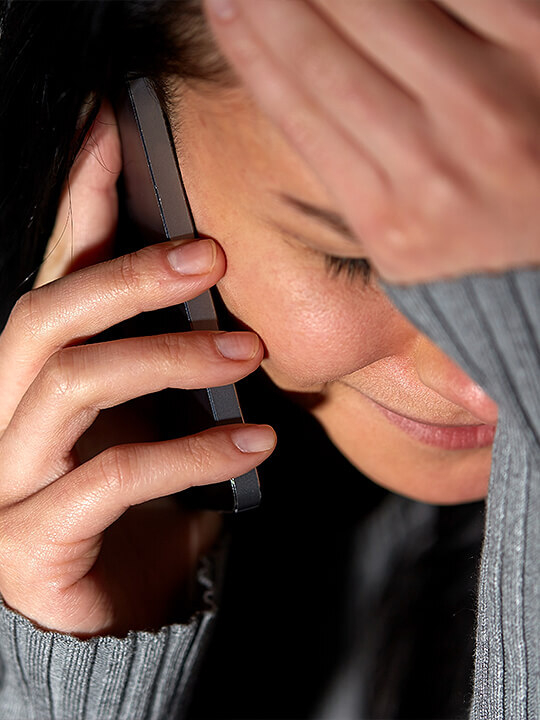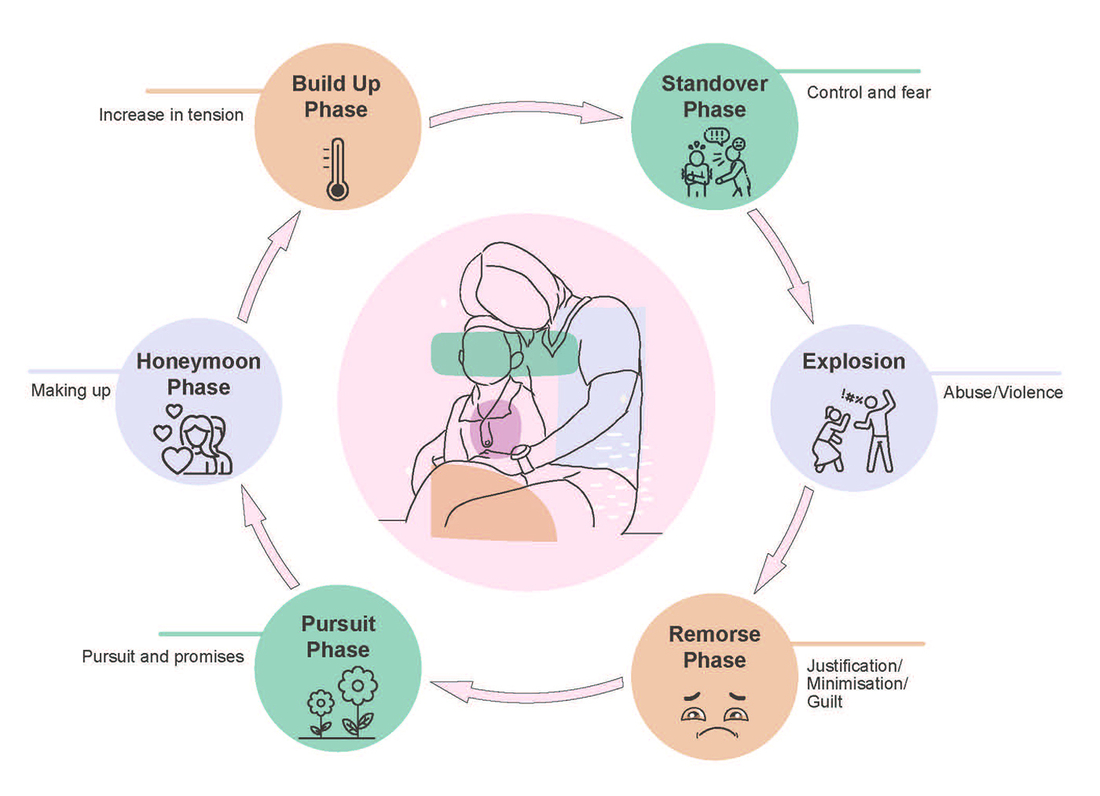Gladstone Women’s Health is the key provider of Domestic and Family Violence Support in the Gladstone and Biloela areas of Central Queensland.
Our Domestic and Family Violence (DFV) services align with the goals and objectives of the Depart of Social Services’ National Plan to End Violence against Women and Children 2022-2032 with a focus on:
- Prevention – working to change the underlying social drivers of violence by addressing the attitudes and systems that drive violence against women and children to stop it before it starts through advocacy, education and workshops;
- Early intervention – identifying and supporting individuals who are at high risk of experiencing or perpetrating violence and prevent it from reoccurring through our Men's Support Services (MSS), counselling, home security upgrades, education, advocacy, and workshops;
- Response – providing services and supports to address existing violence and support victim-survivors experiencing violence through our Court Advocacy and Support Program, counselling, home security upgrades, workshops, education programs and referrals.
- Recovery and healing – helping to reduce the risk of re-traumatisation; and supporting victim-survivors to be safe and healthy to be able to recover from trauma and the physical, mental, emotional, and economic impacts of violence through our counselling, workshops, education and referrals.
Services Australia has a wide range of information about what services and support is available to people who are or have experienced, or at risk of, domestic and family violence.
GWHC Domestic and Family Violence Services
Gladstone Women’s Health offers the following specialised services to women, children and men who have been impacted by family and domestic violence:
- Free counselling for victims.
- Domestic violence information – Our experienced Counsellors are there to support you and provide you with referrals, advice and information on domestic and family violence. We also have some information resources available at our women’s health centres at Gladstone and Biloela, and host regular workshops aimed at helping people understand what is domestic violence; what helps is available to help families impacted by domestic and family violence; and we host regular workshops aimed at helping people affected by DFV.
- Free court support services.
- A home safety security upgrade program – We can assist eligible women with home security upgrades to support and empower them and their children to remain safe in their homes. Technology – such as personal safety devices or CCTV – is also available under the government’s Keeping Women Safe in Their Homes initiative. These resources are also issued as part of a broader safety plan and after a rigorous risk assessment process to determine whether remaining in the home is a safe option. We will keep you informed of the process and progress during the process.
- Men’s perpetrator intervention program.
- Men's Support Services programs and counselling.
- Victim support groups – GWH has a range of workshops and education programs aimed at supporting victims of domestic and family violence and sexual abuse. These include support groups and outings. Please contact us or visit our Events / Workshops page to see upcoming activities.
If you are unsure about the best support for your situation, please call us.

What Is Domestic Violence?
Domestic violence is not just about physical abuse. It includes any form of violence within a relationship, including threats. Often in an abusive relationship a person may be subjected to more than one form of violence.
Domestic violence does not discriminate, but it does often escalate. It happens in all cultures, across all socioeconomic backgrounds, and is often used as a weapon of control and intimidation by a spouse, partner, or ex-spouse. It may happen at any time during a relationship, including while it is breaking down, or after it has ended. In fact, the risk of violence often increases after separation.
Types of abuse
Physical abuse
Physical abuse can include slapping, punching, kicking, biting, shoving, choking or using a weapon or object to threaten or injure. It can and sometimes does result in death.
Psychological abuse
Psychological abuse can include the withdrawal of affection, extreme jealousy, being harassed by phone calls or visits, being threatened, having prized possessions destroyed, having pets hurt or killed, and enduring the suicide threats of the person who is abusive.
Neglect
Neglect is a common form of abuse particularly with young children, with elderly people and with people who have a disability. It can include long-term neglect that may result in physical ailments, as well as occasional neglect used as punishment, e.g. deciding not to help a person to the wash room because they have been difficult.
Verbal abuse
Verbal abuse is constant criticism, name-calling, and put-downs. It includes unjust blaming, false accusations about loyalties or sexual actions. It can include repeated threats of violence against another person, their children, relatives, and/or pets.
Sexual abuse
Sexual abuse means being forced to perform sexual acts or being made to suffer pain or injury during sex. Sexual abuse can also include being infected with HIV, AIDS or with another serious sexually transmitted disease by a person who knows he/she is infected but refuses to tell their partner or to practice safe sex.
Economic abuse
Economic abuse generally applies only to the abuse of adults. It means that even if the family is not poor, the person being abused will have no access to the family’s money; no say over what will be bought; have to unreasonably ask for money; and no money for her own use.
Spiritual abuse
Spiritual abuse means the imposition of beliefs on others in order to control them. It is the exercise of power which fails to recognise the fundamental spiritual worth of the person or which damages another person’s sense of self-worth. Spiritual abuse can also include belittling or attacking another’s spiritual beliefs or preventing them from engaging in religious practice.
Domestic Violence Cycle of Abuse
Domestic violence is rarely a one-time occurrence. It usually takes place as part of a cycle that includes the following phases.
These phases are:
- Build-up phase: The abuser’s anger rises. The relationship does not need to be the cause of the anger.
- Stand-over phase: Tension is evident and the victim may have a sense of 'walking on eggshells.’ They know that a fight is just around the corner, and may alter their behaviour to try to ward it off.
- Explosion phase: The abuse occurs. This can be emotional, sexual, financial or physical.
- Remorse phase: After an incident, the abuser may feel remorse about what they have done, or fear that the victim will tell someone. They may become very apologetic.
- Pursuit phase: The abuser tries to 'win' the victim back by making promises of changing, going to counselling, giving up drugs or alcohol, buying gifts for the victim, and begging her to stay.
- Honeymoon phase: During this phase the abuser is charming, affectionate, and loving. The good times of the relationship happen in this time. This is the stage where the victim questions whether the behaviour will occur again or not and is a difficult phase for a victim to leave the abuser. The victim may also reject help from others she has sought in previous phases of the domestic violence cycle. The relationship appears happy and normal, but the tension begins to build again, and the cycle re-enters the build-up phase.
Domestic violence rarely stops without some form of intervention. The cycle usually repeats itself with the violent episodes escalating in frequency and intensity.
For more information on domestic violence and abusive relationships, visit the Australian Government’s Health Direct website.

Emergency contacts
- Emergencies: Call Triple Zero (000)
- Gladstone Hospital: 4976 3200
- Gladstone Police: 971 3222
- DV Connect Women’s line: 1800 811 811
- DV Connect Men’s line: 1800 600 636
